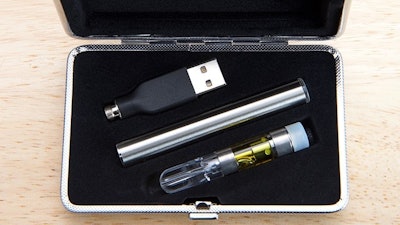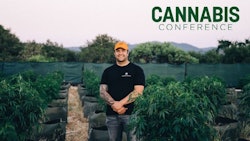
Over the past several months, onlookers have watched heavily hyped, high-inducing cannabinoids divide the hemp industry. As a growing number of states step in to regulate these controversial substances, such as delta-8 tetrahydrocannabinol (THC), multiple cannabinoids join the fray. A semi-synthetic cannabinoid known as THC-O acetate is one substance gaining attention.
To learn more about THC-O acetate, Cannabis Business Times, Cannabis Dispensary and Hemp Grower spoke with board-certified neurologist Ethan Russo, M.D., who’s devoted the last 25 years to studying the medicinal aspects of cannabis and the endocannabinoid system. That includes more than a decade as senior medical adviser to GW Pharmaceuticals, the company behind Epidiolex, the only cannabidiol (CBD)-containing drug approved by the U.S. Food and Drug Administration (FDA). Dr. Russo is now CEO and founder of CReDO Science, a company devoted to making cannabis safer and better.

Jolene Hansen: The hemp industry is seeing a proliferation of controversial cannabinoids, including THC-O acetate. Does this surprise you or did you see this coming?
Dr. Ethan Russo: More the latter. All this nonsense about these synthetics, I see as a byproduct of prohibition. If there were legalization of cannabis products with appropriate regulation, I don't think any of this would be happening. The continuation of prohibition has basically been a catalyst to this kind of development of products that people would like to think are legal but clearly are not. Certainly THC-O acetate falls in that category.
JH: So, what is THC-O acetate and how is it derived?
ER: It starts with tetrahydrocannabinol, better known as THC. That's the natural product that is the main psychoactive component of cannabis. THC-O acetate is what's called a semi-synthetic derivative, or analogue. Through a chemical process using a very toxic chemical called acetic anhydride, you can turn some of the delta-9 THC into THC-O acetate.
Why would someone do this? Well, one reason would be that—reportedly—this is twice or maybe three times more potent than THC. Is that helpful? I'm going to say no, and the reason is that THC is what's known as a weak partial agonist at the CB1 receptor. Now, let's break that down: Weak is easy to understand. Partial means that its binding isn't super tight. Agonist means it stimulates the CB1 receptor, which is the mechanism of action that produces the high of THC, as well as many of its therapeutic properties, including pain reduction, et cetera.
Potent sounds good. But this is a system in the body—the endogenous cannabinoid system—that works with a great deal of subtlety. In other words, what is needed when you're using a drug to stimulate the system is a gentle nudge, not a violent push that comes from something that is a lot stronger than THC itself. So, potent is not necessarily better.
If something is less potent, you can overcome that by using a higher dose. But for many medical purposes, doses of THC that are quite low are what are needed and what is desirable rather than higher doses, which are going to be more associated with side effects than benefits.
JH: When we're talking about people in the hemp industry producing THC-O acetate—and maintaining it’s legal because it came from hemp—are they creating it from delta-8 THC?
ER: Well, they could. Normally, one would make the THC-O acetate from delta-9 THC. So that could be from garden-variety cannabis that has THC in it. If they were making it from CBD, I think that they'd have to convert the CBD to THC first, which can be done in the presence of strong acids. But even that process is not legal, despite the fact that people think it is.
A lot of companies are claiming this is legal based on the Farm Bill of 2018 [The Agriculture Improvement Act of 2018]. I don't know that [the farm bill] supplants the Controlled Substances Act of 1970, which basically said there are parts of the cannabis plant, like stalks, that aren't necessarily illegal by themselves, but once you try to do chemical extractions on them or change them into something else, that's illegal.
Additionally, delta-8 and THC-O acetate would both be considered analogues of delta-9 THC. There was a 1986 law—a nasty piece of legislation passed by Congress called the [Federal] Analogue Act—that said if you make an analogue, a similar molecule to something that's already illegal, meaning delta-9 THC, that the analogue that you've made is also illegal. … So, no one should harbor illusions that all this is legal. Many of us feel that it absolutely is not.
Now, there's an additional wrinkle here: The process of making THC-O acetate is inherently dangerous. The acetic anhydride that's part of the process is extremely flammable and potentially explosive. This is something that's got to be done in a technical lab with a vacuum hood [and] no exposure to humans.
"So, between the inherent danger of the process to make it, the potential toxicity of the product, and its illegality, I've got to recommend that people forget about it. It's just not something that people should be trying." - Dr. Ethan Russo, M.D.
Beyond that, there's so little that's been done with THC-O acetate, I have no guarantee that it isn't potentially toxic in some other fashion. Maybe it doesn't get broken down by the liver properly and it can accumulate. If it is twice or three times more potent than THC, it's an immediate recipe for potential serious side effects. [Note: Dr. Russo stresses that THC-O acetate’s potency is not yet known.]
So, between the inherent danger of the process to make it, the potential toxicity of the product, and its illegality, I've got to recommend that people forget about it. It's just not something that people should be trying.
JH: Do you see any potential applications for THC-O acetate?
ER: I can't rule that out. Again, its improved potency—putative improved potency—may or may not be helpful. If it went through the normal process of being tested for toxicology in animals, and then went through the usual processes of studying it in humans in clinical trials, it might have an application. But it's more likely that any benefits are going to be outweighed by other problems. It remains to be seen.
There would be the potential that it could be useful medically, but—especially given that the product and process are illegal—I don't trust the companies trying to make this [will create] a quality product that's going to be safe for consumers. I'm quite sure that it's not going to be.
When something like this is made, it's not 100% conversion. There's always going to be [possible contaminants and byproducts], and that's a real pitfall, potentially. There can be some nasty chemicals involved in the process that really have nothing to do with cannabis per se, but are going to be very, very potentially harmful to the liver or other organs. …
[These chemicals] need to be separated out in the process, but goodness knows how tight the controls are in the manufacturing process. It doesn't instill confidence in somebody like me that it's all going to be done through a high safety standard.
JH: What are your concerns about how THC-O acetate is being used, particularly with vaping?
ER: With cannabis concentrates, there's great potential for a number of problems. First is too high a dose, and that can happen with garden-variety THC all the time. Many vape pens have 70% to 90% THC. That is overshooting what anybody should need.
I know of a situation—someone in the cannabis industry who’s been smoking cannabis for decades—who tried a vape pen for the first time and immediately passed out cold. Had what’s called a vasovagal syncope [a sudden drop in heart rate and blood pressure that leads to fainting] from too-high a dose of THC. So, if we're dealing with THC-O acetate, and it is two or three times more potent, there's great potential there [for similar problems].
What happens when someone has too much THC? Well, it's not pretty. A number of things: paranoia, anxiety. They can have what's called a toxic psychosis—basically it's a kind of poisoning where you take a vacation from reality for a period of time. In other words, you develop psychotic symptoms, delusions, hallucinations. It takes some hours to pass, and you're likely to end up in the emergency room with super-strong sedatives to help bring you down. That doesn't mean there'll be permanent damage, but it's no picnic.
Another possible side effect is what I mentioned before, a vasovagal syncope, where you pass out on your feet, fall to the floor, potentially break an arm or have a skull fracture. These kinds of things happen. Additionally, when we're dealing with high-potency material and people do it on a repetitive basis, eventually they're going to develop tolerance.
Now tolerance sounds like a nice word. But in this instance, it means that over time, someone is going to need more and more and more to attain their desired level of high. This development of tolerance is clearly associated with high-potency vape pens, and potential is even greater for a substance like THC-O acetate—if it is indeed two or three times more potent.
Under these conditions, it's opening up the whole range of other possible side effects, including something called cannabinoid hyperemesis syndrome, where exposure to THC turns from being the drug that helps allay nausea and vomiting to one that produces nausea, vomiting, abdominal pain, et cetera. This is a serious condition. We just released a journal article about it. Fortunately, it doesn't affect everyone. It seems to have genetic susceptibility in some people.
There's always the potential for what are called off-target effects, meaning it could have some other mechanism of action that regular THC doesn't have. … You don't know until things have been properly tested. So, we know what it could do in terms of having a pharmacology that's similar to THC. But there's a potential for off-target effects, and that could be anything in any bodily system.
JH: Is there anything else you’d like to say about THC-O acetate, specifically to hemp growers and processors?
ER: I'd say don't go there. Concentrate on producing a quality product, where you know what went into it and that it was properly made—no pesticides, no heavy metals, all that good stuff—and forget about this. ... Find something else to do with your resources.
This interview was edited for length and clarity.
Jolene Hansen is a freelance writer specializing in the hemp, cannabis and horticulture industries. Reach her at [email protected].

























